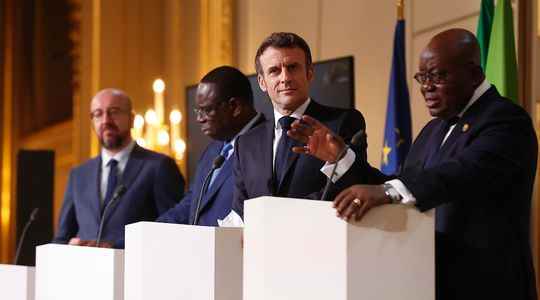No more expressing oneself alone. At the Elysée, this Thursday morning, there were four desks. Alongside Emmanuel Macron, the Heads of State of Senegal, Ghana, and the President of the European Council Charles Michel, gathered to discuss the future of the fight against terrorism in the Sahel. The message from Paris? Any French decision is concerted with its partners. Starting with the most anticipated: the withdrawal of the Barkhane anti-terrorist operation from Mali. Emmanuel Macron formalized the break after months of tension with the ruling junta in Bamako due, in particular, to the contract passed through the military, according to Paris, with the company of Russian mercenaries Wagner. The departure “will be carried out in an orderly manner, with the Malian armed forces and the United Nations mission in Mali” specified the president. It will involve the closure of the military bases of Gossi, Ménaka and Gao (north-east), within four to six months, according to the president.
A high-risk period therefore begins for France and its European allies involved in the Takuba task force, a coalition of around 800 European special forces under the command of Barkhane. Organizing this exit without further exposing the forces to jihadist attacks will be the major challenge, on which the French army has been working for months. We will also have to deal with the distrust of local populations. At the end of November, a convoy of about sixty vehicles of the operation, on its way to Mali, had been targeted on several occasions (Burkina Faso and Niger) by demonstrators hostile to the French presence.
After nine years of engagement, fifty-three soldiers fallen under the colors of the French flag, and a jihadist violence in constant progression in the Sahel, Emmanuel Macron refuses however to speak of failure. “We have avoided the worst” in Mali, namely “the total collapse” of the country, he judges, in reference to the intervention of 2013, intended to stop the descent of terrorists from North to South. Today, France and its partners do not share the “strategy” and “the hidden objectives” of the Bamako junta, declared the French president, while specifying that development aid would be maintained in this country, under provided that it does not serve the interests of Wagner or the terrorists.
Niger, post-Barkhane pivot
However, Barkhane’s withdrawal from Mali does not sign the end of operations in the Sahel. By June 2022, the system will be reorganized in the region. The objective: to move from an external operation scheme to a much more “interwoven” operational partnership with the local armies. In short, put an end to the installation of large bases. That of Chad and the air base in Niger will nevertheless be retained.
Niger, which already hosts 800 French soldiers, will be the centerpiece of the post-Barkhane period. After intense discussions with Niamey, the authorities of the country, initially hostile to the arrival of European soldiers, accepted the redeployment of certain soldiers participating in Takuba alongside the Nigerien armed forces in the border region of Mali.
It remains to be seen how many and under what circumstances. The new system should also involve more the countries of the West African coast neighboring the Sahelian strip (Côte d’Ivoire, Ghana, Togo, Benin, Senegal), won over by the terrorist threat. Latest episode, the triple attack that killed nine people in the W nature park, in northern Benin, between February 8 and 10.
“The fight against terrorism in the Sahel cannot be the sole business of African countries,” declared Senegalese President Macky Sall, currently head of the African Union. “We are happy that the commitment has been renewed to remain in the region and to rearticulate the system”. Not sure that public opinion in these countries shares this opinion. For Niger, the political risk is not negligible. Especially since it is in this country that three demonstrators died at the end of November while trying to prevent the passage of the French military convoy in the town of Téra. This serious incident had, at the time, caused tensions between Paris and Niamey.
In the future, the Elysée is betting on a much less visible device, which will rely on air strikes and armed drones. The workforce will also be reduced over time, from 4,600 men today to 3,000 maximum. But some experts are already warning of the risk of making the same mistakes as in the past, in this case favoring the military approach, despite the commitments already made, since the Pau summit in 2020, and repeated this February 17 by President Macron. “It is absolutely necessary to change priorities, and put governance and politics in the foreground, before the military… rather than the reverse” insists a connoisseur of the region.
